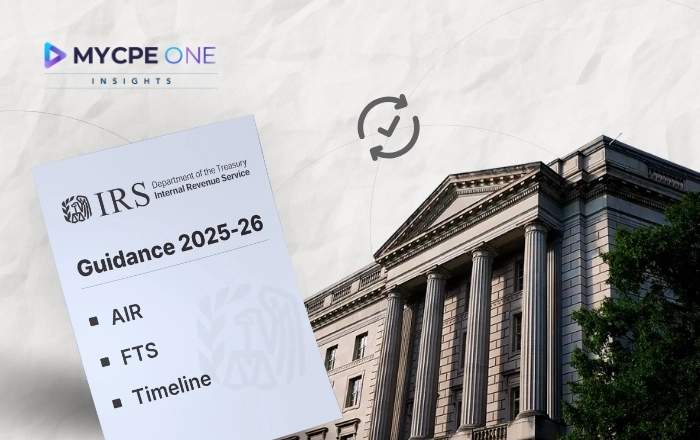


Join 250,000+
professionals today
Add Insights to your inbox - get the latest
professional news for free.

Join our 250K+ subscribers
Join our 250K+ subscribers
Subscribe29 JUL 2025 / IRS UPDATES

The IRS has issued a memo outlining changes to their auditing processes for large corporations with the aim to cut audit cycle times and focus on important issues. The changes, which include phasing out burdensome documentation and expanding Accelerated Issue Resolution, are part of a broader effort to modernize the Large Business & International division and improve efficiency in tax administration.
The IRS just dropped a fresh memo to shake up how it audits large corporations, and for once, it’s not adding red tape. The goal? Cut audit cycle times, focus on what matters, and actually treat corporate taxpayers like customers. It’s part of a broader push to modernize the LB&I (Large Business & International) division and, ideally, make audits feel less like dental work without anesthesia. Oh, and while all this is happening, former Acting IRS Commissioner Douglas O’Donnell quietly took his talents to KPMG. Just tossing that in because yes, the timing raised a few eyebrows in tax circles. Now, back to the real action: what’s changing, and why it actually matters.
One of the first moves? Phasing out the Acknowledgement of Facts (AOF) document request process. If you’ve ever had to explain to an agent, in excruciating detail, what your already-audited depreciation schedule means only to get a polite “thanks, we’ll circle back in three months,” you’ll appreciate this change. The AOF was supposed to help the IRS and taxpayers get on the same page before fighting over the law. But in reality, it dragged things out and offered little value. So, the IRS is saying “thanks, but no thanks.” Starting now through the end of 2025, you can still use AOF if you want but it’ll be fully gone by 2026. Consider this your official heads-up to stop burning hours on paperwork that doesn’t move the needle.
Now for the good news: Accelerated Issue Resolution (AIR) is getting a bigger spotlight. The IRS is expanding AIR to apply to large corporate cases, yep, even those outside the old Coordinated Examination Program. Why care? Because AIR lets you settle recurring issues across multiple years with a single closing agreement. No more re-litigating the same R&D credit treatment five times over. Settle it once and move on. It’s the kind of efficiency upgrade that actually helps both sides, and that’s a rare bird in tax admin. The memo makes it clear: AIR is here to cut delays, lower interest costs, and give corporations some long-overdue tax certainty. And in the current environment, certainty is gold.
Next up: the Fast Track Settlement (FTS) process. Historically, it’s been a useful way to hash things out with IRS Appeals before heading into the black hole of litigation. But there’s been a growing problem that agents sometimes reject FTS requests without much explanation. Not anymore. Under the new guidance, FTS denials will now require more scrutiny and higher-level sign-off. That means fewer snap rejections and more transparency when the IRS says no. It also signals that the agency wants taxpayers to actually use FTS and not just read about it in a dusty IRM section. In plain English: if you’re trying to settle fast, the door’s now a little more open.
Maybe. The July 25 memo, officially titled Reinforcing the Customer-Focused, High-Efficiency Large Business & International Examination Process, makes no secret about the agency’s goals: shorten timelines, reduce friction, and shift to a more collaborative posture. It even uses the word “customer” more than once, rare for a division better known for “gotcha” audits and thick IDRs. To be fair, this isn’t the first time the IRS has promised to streamline. But the memo does come with real policy shifts, a clear timeline, and invitations for public feedback in 2025 and 2026. It’s less talk, more action. And that alone is worth a second look.
Want the full memo? You can read the IRS’s Interim Guidance Memorandum here.
These changes won’t magically fix every audit headache. But they’re a step toward smarter enforcement where the IRS prioritizes risk, respects time, and maybe even listens. So, whether you’re a tax director tired of explaining your basis calculations for the fourth time or an advisor helping clients navigate LB&I’s maze, keep this memo on your radar. There’s a new playbook in town, and it’s trimming the fat. Just don’t expect handwritten thank-you notes from your revenue agent. Let’s not get crazy. Join thousands of pros staying informed. Sign up now.
Until next time…
Don’t forget to share this story on LinkedIn, X and Facebook
📢MYCPE ONE Insights has a newsletter on LinkedIn as well! If you want the sharpest analysis of all accounting and finance news without the jargon, Insights is the place to be! Click Here to Join
Website Services for CPA & Accounting Firms - Starting $69/month.
Is your website attracting clients—or turning them away? MYCPE ONE’s Website Development Services, starting at just $69/month, create high-converting, professional websites tailored for accounting firms like yours.
With over 400 designs to choose from and a dedicated webmaster, we handle it all for you—no DIY required.
Get started today and create a website that works for your firm with MYCPE ONE!
Make a lasting impression. Boost conversions. Stay secure.